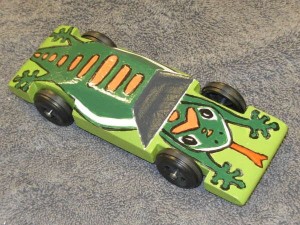I mentioned in a previous post that I would elaborate on the linguistic concepts of non-intersective and anti-intersective adjectives, so here we go.
Intersective adjective: The adjective intersects with other uses of the same descriptor. A green car and a green frog are intersective in that they are both green, and green means the same thing in both cases: both the car and the frog are within the same subset: that of things that are green.

Frog Car photo by Darin McGrew / Creative Commons
Relative intersective adjective: These differ from regular intersective adjectives in that they are—you guessed it—relative. A big car and a big frog are both described as big, but big is a relative term—the big frog is only big in relation to other frogs, not in relation to a car. They can’t be considered as being members of the same subset, “things that are big,” without qualification.
Non-intersective adjective: This is where it gets a little weirder. Non-intersective adjectives are descriptors that may or may not describe their noun. The most frequently cited examples are words such as alleged, probable, suspected and possible. In the sentence, “A possible motive for her alleged crime is jealousy,” there may or may not be a motive, and there may or may not be a crime. Note that unlike most intersective adjectives, most non-intersective adjectives have corresponding adverb or noun forms: allegedly, probably; suspect (n), possibility.
Anti-intersective adjective: Anti-intersective, or privative, adjectives are descriptors that negate the noun—the described noun cannot be a member of its own set. The best examples of anti-intersective adjectives are fake and counterfeit. A fake gun is never a member of the subset “things that are guns.” A counterfeit Rembrandt cannot be a member of the subset “Rembrandts.”
Non-intersective and anti-intersective adjectives usually come early in adjective sequence. Using Radiohead lyrics as an example, “a fake Chinese rubber plant” is a Chinese rubber plant that is fake. If you instead said, “a Chinese fake rubber plant,” you’d be talking about a rubber plant that is fake and made in China. If you said, “a Chinese rubber fake plant,” you’d be describing a fake plant made out of Chinese rubber. The song title, “Fake Plastic Trees,” is a lyrical play on words that would be redundant in normal (non-lyrical) usage: although a rubber plant is a real plant, a plastic tree is a fake tree. In the title “Fake Plastic Trees,” both fake and plastic could qualify as anti-intersective adjectives: plastic trees are not part of the set “things that are trees,” nor are fake trees. In regular usage, although you might say “fake rubber tree/plant,” you would probably say either “fake tree” or “plastic tree,” but not fake plastic tree.”
Who doesn’t love a green frog car?
Pingback: Quora